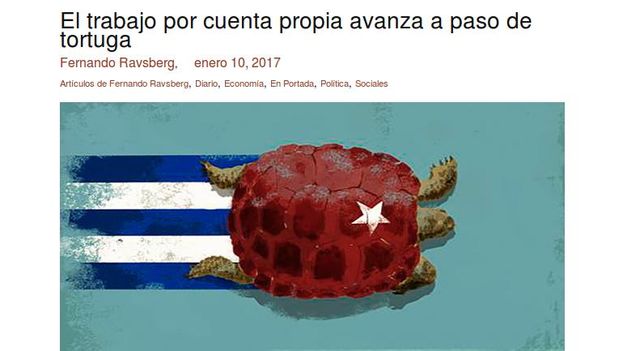
![]() 14ymedio, Mario Penton, Miami, 30 January 2017 — The controversy between the most radical wing of Cuban officialdom and the correspondent of Uruguayan origin resident in Cuba, Fernando Ravsberg, is rising in tone.
14ymedio, Mario Penton, Miami, 30 January 2017 — The controversy between the most radical wing of Cuban officialdom and the correspondent of Uruguayan origin resident in Cuba, Fernando Ravsberg, is rising in tone.
The latest blasts from the most orthodox defenders of “revolutionary” journalism call out nine alleged false pieces of news from the communicator. The list is preceded by a phrase resuscitated from former leader Fidel Castro, who in 2006 called the then BBC correspondent in Havana “the greatest liar,” for daring to question his energy revolution in the midst of blackouts.
The animosity toward Ravsberg is not new; he was fired from the BBC and is now a correspondent for the leftist Spanish publication Publico. Last August the vice president of the Journalists and Writers Union (UPEC), Aiza Hevia, launched the first darts against the journalist for his defense of the ousted official journalist José Ramírez Pantoja, of Radio Holguin. On that occasion she even floated the idea of expelling him from the country.
“The pack is coming, hungry for revenge,” said Ravsberg through his blog, Letters from Cuba.
Last August the vice president of the Union of Journalists and Writers, Aixa Hevia launched the first darts against the journalist for his defense of the ousted official journalist José Ramírez Pantoja, of Radio Holguin
“They shout that I am part of conspiracy of the international information monopolies against the Cuban Revolution but they omit that I work on a leftist publication because it doesn’t help their defamation campaigns,” he said
The latest controversy arose when Ravsberg published a critical note about the Cuban economy on his blog, accompanied by a caricature of a tortoise leaving a trail with the colors of the Cuban flag. This led to several official journalists feeling especially offended.
Carlos Luque Zayas launched the first stone from a blog. Under the title “Ravsberg: From Insult to Manipulation,” the journalist wrote an article to “protest” the use of national symbols. Next, from Granma, the official organ of the Communist Party, Pedro de la Hoz wrote, “You can agree or disagree with the contents of the controversial note, but the grotesque manipulation of one of our patriotic symbols cannot be overlooked.”
Ravsberg counterattacks saying that in the Cuban media the image of the flag is used indiscriminately. He offers as an example the case of the “thousands of flags” which everyone walks over in every parade organized by the authorities in the Plaza of the Revolution.
For the Uruguayan journalist, who spent more than 20 years working on the island as a correspondent for foreign media, “there is a lot more than offended patriots” behind the attacks on his work.
For the Uruguayan journalist, who spent more than 20 years working on the island as a correspondent for foreign media, “there is a lot more than offended patriots” behind the attacks on his work.
“There is a campaign organized by the extremists,” he says, with the Cuban government’s intention “for years” to expel him from the country.
“They do not support a different voice, nor different optics. For extremists the only truth is ‘their truth’ and all other criteria must disappear or at least remain in a fearful silence while they become the only voice, “he adds.
In the revolutionary blogosphere, there are those who even questioned his seriousness as a journalist. Iroel Sánchez, one of the most sectarian (and official) bloggers on the island and also a staunch critic of Ravsberg, accuses him of being “promoter of apocryphal interviews with anonymous subjects.”
Ravsberg, who was criticized in the past for his closeness to the regime, defends himself by saying that “no matter how much the obscurantist forces do,” Cuba advances.
According to the journalist, with regards to the alternative digital media that has emerged during recent years on the Island, “a way of doing a journalism has emerged that is already far removed from the infantile topics of the extremes.”
“They call on the government to use force because they know they are incapable of participating in a battle of ideas, where they would have to fight with arguments and proposals.”
